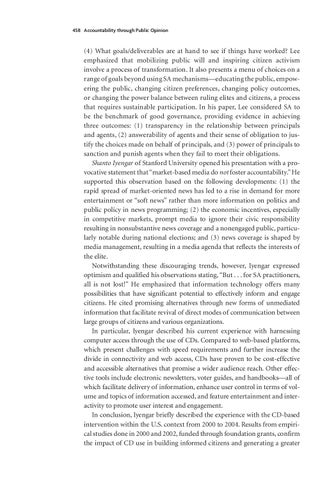458 Accountability through Public Opinion
(4) What goals/deliverables are at hand to see if things have worked? Lee emphasized that mobilizing public will and inspiring citizen activism involve a process of transformation. It also presents a menu of choices on a range of goals beyond using SA mechanisms—educating the public, empowering the public, changing citizen preferences, changing policy outcomes, or changing the power balance between ruling elites and citizens, a process that requires sustainable participation. In his paper, Lee considered SA to be the benchmark of good governance, providing evidence in achieving three outcomes: (1) transparency in the relationship between principals and agents, (2) answerability of agents and their sense of obligation to justify the choices made on behalf of principals, and (3) power of principals to sanction and punish agents when they fail to meet their obligations. Shanto Iyengar of Stanford University opened his presentation with a provocative statement that “market-based media do not foster accountability.” He supported this observation based on the following developments: (1) the rapid spread of market-oriented news has led to a rise in demand for more entertainment or “soft news” rather than more information on politics and public policy in news programming; (2) the economic incentives, especially in competitive markets, prompt media to ignore their civic responsibility resulting in nonsubstantive news coverage and a nonengaged public, particularly notable during national elections; and (3) news coverage is shaped by media management, resulting in a media agenda that reflects the interests of the elite. Notwithstanding these discouraging trends, however, Iyengar expressed optimism and qualified his observations stating, “But . . . for SA practitioners, all is not lost!” He emphasized that information technology offers many possibilities that have significant potential to effectively inform and engage citizens. He cited promising alternatives through new forms of unmediated information that facilitate revival of direct modes of communication between large groups of citizens and various organizations. In particular, Iyengar described his current experience with harnessing computer access through the use of CDs. Compared to web-based platforms, which present challenges with speed requirements and further increase the divide in connectivity and web access, CDs have proven to be cost-effective and accessible alternatives that promise a wider audience reach. Other effective tools include electronic newsletters, voter guides, and handbooks—all of which facilitate delivery of information, enhance user control in terms of volume and topics of information accessed, and feature entertainment and interactivity to promote user interest and engagement. In conclusion, Iyengar briefly described the experience with the CD-based intervention within the U.S. context from 2000 to 2004. Results from empirical studies done in 2000 and 2002, funded through foundation grants, confirm the impact of CD use in building informed citizens and generating a greater
